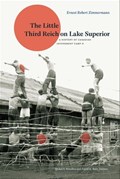An in-depth history of one of Canada’s World War II internment camps that held both Nazis and anti-Nazis alike.
For eighteen months during the Second World War, the Canadian military interned 1,145 prisoners of war in Red Rock, Ontario (about 100 kilometres northeast of Thunder Bay). Camp R interned friend and foe alike: Nazis, anti-Nazis, Jews, soldiers, merchant seamen, and refugees whom Britain feared might comprise Hitler’s rumoured “fifth column” of alien enemies residing within the Commonwealth. For the first time and in riveting detail, the author illuminates the conditions in one of Canada’s forgotten POW camps. Backed by interviews and meticulous archival research, Zimmermann fleshes out this rich history in an accessible, lively manner. The Little Third Reich on Lake Superior will captivate military and political historians as well as non-specialists interested in the history of POWs and internment in Canada.
“Most of us have an image of what prisoner of war camps looked like, either from documentary footage about Nazi POW camps, or feature films about World War II, or television situation comedies. The Little Third Reich on Lake Superior shatters all of those stereotypes and, through diligent assembly of public records, multiple library archives and personal interviews, gives us an in-depth picture of a Canadian internment camp. All of this is skillfully organized in a reader-friendly, chronological way.” —Michael Sabota, Chronicle Journal
“The study shines light on the lesser-known Canadian prisoner of war (POW) camps in World War II. In this well-researched study, Zimmermann describes not only Camp R, but the inmates, guards, military command structure, politicians, and general political environment in Canada and Britain. . . . The work is easy to read and deftly supported by a broad array of sources. Zimmermann’s analysis encompasses Canadian and British history. . . . The Little Third Reich on Lake Superior sets a high standard for future research into civilian internment camps.” —Anna Marie Anderson, The Journal of Military History

